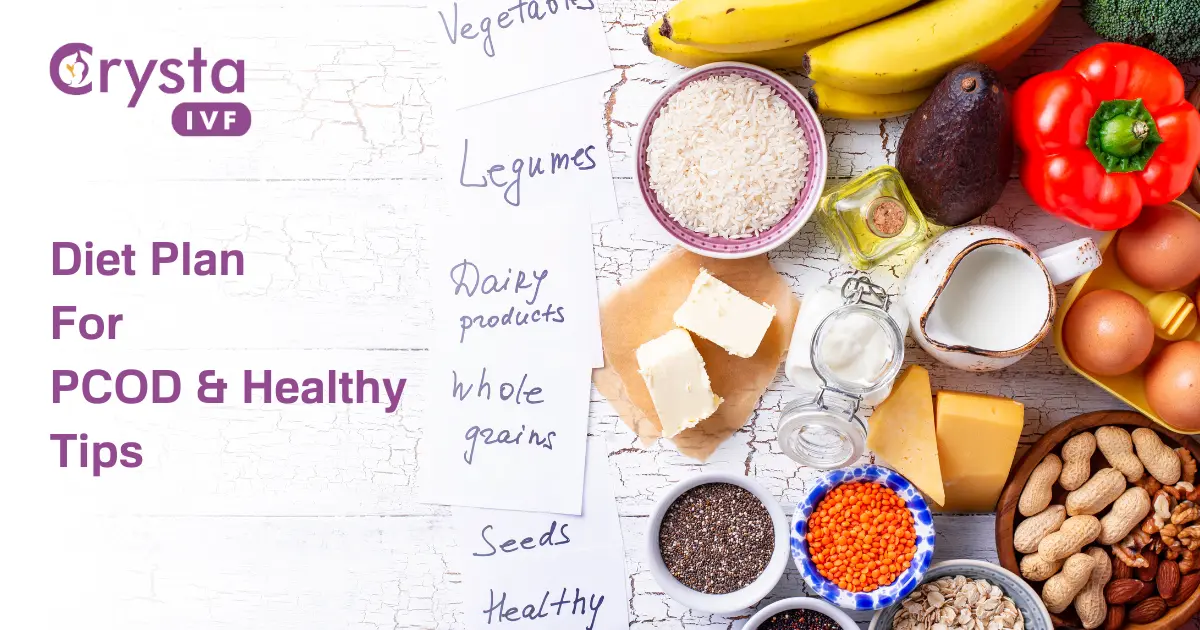Polycystic Ovary Syndrome, or PCOD, is a common health condition that affects many women. It happens when there’s an imbalance in hormones, which are like messengers in our bodies. In PCOD, small fluid-filled sacs called cysts can form on the ovaries. These cysts can make the ovaries larger than usual. PCOD is quite common, and it’s important to take it seriously. Many women with PCOD can face issues like irregular periods, trouble getting pregnant, and other health problems. That’s why it’s crucial to address PCOD and find ways to manage it. One of the big concerns with PCOD is that it can make it harder for someone to get pregnant, and it can sometimes lead to other health issues, like diabetes or heart problems. One important way to manage PCOD is through a diet plan for PCOD, focusing on the food we eat daily.
If you are not aware of PCOD symptoms and causes, read this blog:
What is PCOD: Everything You Need to Know?
The food we consume can make a big difference in how we feel and how our bodies work. By making smart food choices, we can help control PCOD symptoms and even improve our overall health. In this blog, we’ll provide provide PCOD diet chart and also explore how our food can be a powerful tool in managing PCOD.
Benefits of taking a PCOD-Friendly Diet
Choosing the right food can bring several benefits for those dealing with PCOD. Here are some of the advantages:
- Managing PCOD Symptoms: A PCOS diet plan can help control and reduce the symptoms of PCOD. This includes managing irregular periods, reducing acne, and tackling excessive hair growth.
- Better Weight Control: It can aid in maintaining a healthy weight or shedding extra pounds. Weight management is crucial for many with PCOD because it can help regulate hormone imbalances.
- Improving Insulin Resistance: PCOD and insulin resistance often go hand in hand. The right foods can help your body use insulin better, lowering the risk of diabetes and other health issues.
- Regulating Hormones: Eating the right foods can help balance hormones, making you feel better and more in control of your body.
- Fostering Fertility: For those looking to have a baby, a PCOD-friendly diet can increase the chances of getting pregnant by managing the hormone imbalances that can make conception difficult.
- Overall Health: The benefits of a PCOD diet plan go beyond PCOD itself. It can improve your overall health, reducing the risk of heart problems and diabetes.
Key Nutrients for PCOD Diet Plan
Balanced nutrition is essential for managing PCOD effectively. Several key nutrients play a crucial role:
- Fiber: High-fiber foods like whole grains, fruits, and vegetables help regulate blood sugar and improve insulin sensitivity, which is important for PCOD management.
- Protein: Lean protein sources such as chicken, fish, and plant-based options like beans and tofu support muscle health and provide sustained energy.
- Healthy Fats: Omega-3 fatty acids from fatty fish, flaxseeds, and walnuts help reduce inflammation and support hormone balance.
- Vitamins and Minerals: Vitamin D is essential for hormonal balance and overall health. Minerals like chromium help to improve insulin sensitivity, and magnesium supports glucose metabolism.
Diet Plan for PCOD Patients
A PCOD diet plan is vital for fertility because it can help regulate hormones, manage insulin resistance, and support a healthy weight—all crucial factors for getting pregnant. A well-balanced PCOD diet chart can help to improve overall reproductive health and increase the chances of successful conception for people with PCOD. You can follow this PCOS diet plan to get pregnant. However, you shall discuss this with your doctor & nutritionist and make some personalized recommendations.
| Meal | Options |
| Breakfast | Option 1: Vegetable poha (flattened rice) with peas and carrots. Option 2: Upma (semolina porridge) with added vegetables like bell peppers and tomatoes. Option 3: Whole wheat paratha with curd and a side of green chutney. Option 4: Vegetable dalia (broken wheat) with added moong dal and lots of vegetables. Option 5: Oats porridge with nuts, seeds, and a dash of honey. |
| Mid Morning Snack | Option 1: A small serving of mixed nuts (almonds, walnuts, and pistachios). Option 2: A fruit like guava or an orange. Option 3: Buttermilk with a pinch of roasted cumin powder. |
| Lunch | Option 1: Roti with a chickpea curry (chole) and mixed vegetable sabzi. Option 2: Brown rice with dal (lentils) and a side of spinach or fenugreek (methi) leaves. Option 3: Quinoa pulao with mixed vegetables and a yogurt-based raita. |
| Afternoon Snack | Option 1: Greek yogurt with a drizzle of honey. Option 2: Sliced cucumber and carrot with hummus. Option 3: A piece of fruit like apple or papaya. Option 4: Roti with a lentil curry (dal) and mixed vegetable sabzi. Option 5: Brown rice with black chana (chickpeas) curry and a side of spinach. |
| Dinner | Option 1: Grilled fish or paneer (cottage cheese) with a side of broccoli and whole wheat roti. Option 2: Masoor dal (red lentil) soup with brown rice and a spinach salad. Option 3: Tofu stir fry with bell peppers and quinoa. |
| Evening Snack (if required) | Option 1: A small bowl of mixed berries. Option 2: Roasted chickpeas or makhana (fox nuts). Option 3: Herbal tea with a slice of lemon. |
Some additional tips to follow:
- Opt for whole grains like brown rice, whole wheat, and quinoa.
- Include lean protein sources like lentils, legumes, and yogurt.
- Use healthy cooking methods such as grilling, steaming, or sautéing.
- Limit sugar and processed foods.
- Control portion sizes to avoid overeating and manage weight.
- Drink plenty of water throughout the day.
- Consult a healthcare provider or a dietitian for a personalized plan tailored to your needs.
- Eat at regular intervals to maintain steady blood sugar levels and energy throughout the day.
- Avoid skipping meals to prevent blood sugar spikes and crashes.
Types of Food to Include in a PCOD Diet Chart
A PCOS diet plan should focus on regulating blood sugar levels, managing insulin resistance, and reducing inflammation. Here are some food recommendations:
- Complex carbohydrates (sources like whole grains like brown rice, quinoa, whole wheat pasta, and oats.
- Lean proteins like skinless poultry, fish, tofu, and legumes.
- Healthy fats like avocados, nuts, seeds, and olive oil.
- Anti-inflammatory foods like turmeric, ginger, and fatty fish (salmon, mackerel, sardines).
- Dairy alternatives like almond milk, coconut milk,
- Low-glycemic fruits like berries, cherries, and apples
- Nuts and seeds like Almonds, walnuts, flaxseeds, and chia seeds
- Green Tea
Foods to Avoid In PCOD
It is important to avoid or limit certain foods that can exacerbate symptoms, worsen insulin resistance, and contribute to hormonal imbalances. Here are some foods and lifestyle choices to avoid or minimize when managing PCOS:
- Highly processed foods like unhealthy fats, added sugars, packaged snacks, fast food, and sugary items.
- Minimize or eliminate foods and beverages with added sugars.
- Avoid foods high in trans fats like packaged snacks and baked goods.
- High Glycemic Index Carbohydrates, which include white bread, sugary cereals, and other refined grains.
- Dairy products
- Red Meat
- Excessive caffeine and alcohol.
- Soy Products
- Low-fiber food like white rice, white bread, and most processed cereals.
- High-Sodium foods
- Artificial Sweeteners
What precautions to take during pregnancy with PCOS?
Pregnancy with PCOS may require some extra precautions to ensure a healthy and safe pregnancy. Here are important precautions to consider:
- Schedule a prenatal appointment as soon as you know you’re pregnant.
- Consult with healthcare for PCOS diagnosis.
- Manage your blood sugar level.
- Focus on the PCOS diet plan to get pregnant by adding a balanced diet with whole grains, lean proteins, and plenty of fruits and vegetables.
- Engage in regular, safe exercise
- Talk to your healthcare provider about any necessary supplements.
- Manage blood Pressure
- If you need fertility treatments to conceive, contact your healthcare provider.
- Maintain a healthy weight during pregnancy.
- Managing stress by following relaxation techniques like yoga or meditation.
- Get adequate rest and sleep to support a healthy pregnancy.
Also read: How To Get Pregnant With PCOS?
Takeaway
A carefully structured PCOD diet plan can make a significant difference in improving overall health and well-being while also addressing health concerns related to PCOS. For those on a fertility journey, a personalized fertility-focused diet plan can offer even greater benefits. By regulating insulin levels, balancing hormones, and addressing nutrient deficiencies, this plan enhances your chances of successfully starting or growing your family. It is important to note that the one-size-fits-all approach doesn’t apply to PCOS. Every individual is unique, and what works for one person may not work for another. Therefore, seek guidance from the best IVF Clinic in Delhi for a personalized diet plan based on your symptoms, needs, and goals.
 Verified by Crysta IVF Fertility Experts
Verified by Crysta IVF Fertility Experts
Related Blog – How to cure PCOS permanently?




